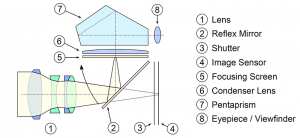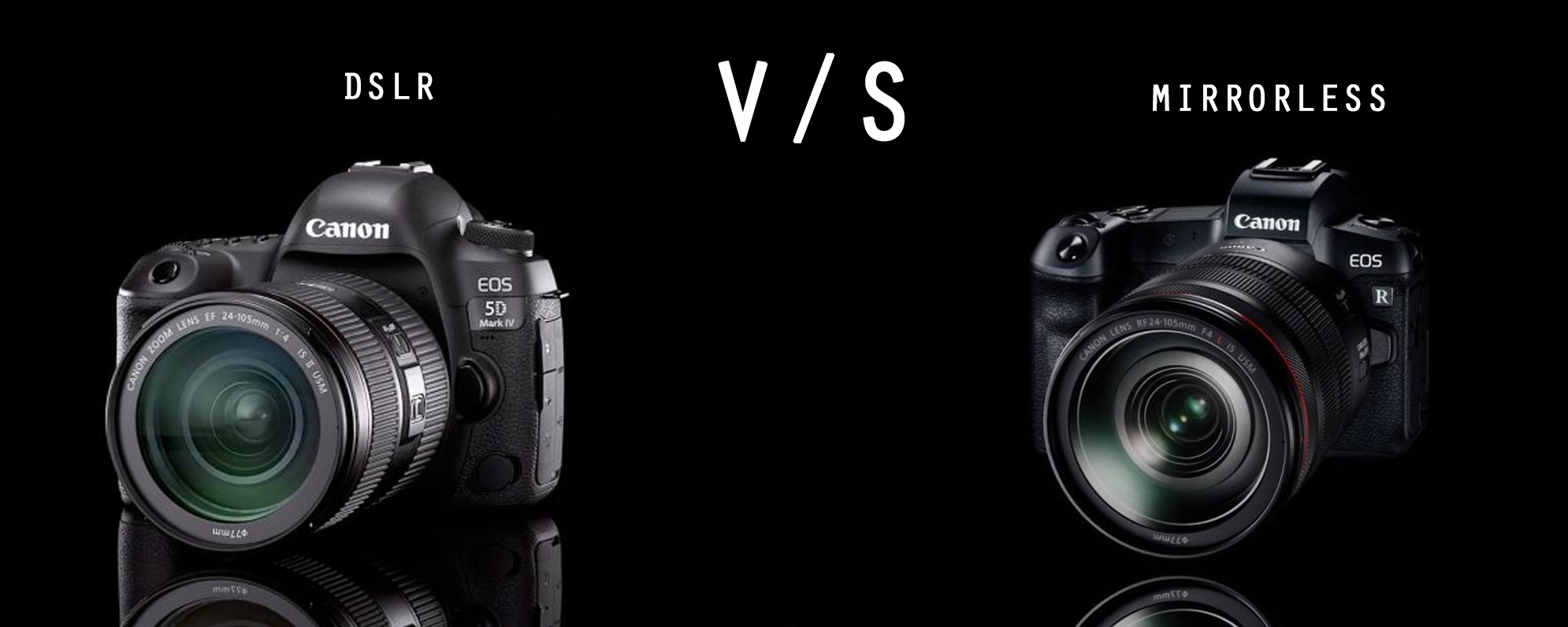Which camera should I buy ? Shall i buy DSLR or Mirrorless camera systems ? These are some questions which are hitting my inbox on Instagram everyday. You can get great photos with either, but each has its pros and cons. So I have compiled a list of those to help you make the decision that’s best for your photography needs.
First lets understand what is a Dslr camera and Mirrorless camera ? And how they are different than eachother.
DSLR Camera :
 DSLR isa digital camera that uses a mirror mechanism to either reflect light from a camera lens to an optical viewfinder (which is an eyepiece on the back of the camera that one looks through to see what they are taking a picture of) or let light fully pass onto the image sensor (which captures the image) by moving the mirror out of the way.
DSLR isa digital camera that uses a mirror mechanism to either reflect light from a camera lens to an optical viewfinder (which is an eyepiece on the back of the camera that one looks through to see what they are taking a picture of) or let light fully pass onto the image sensor (which captures the image) by moving the mirror out of the way.
Mirrorless Camera :
Mirrorless camera is one that doesn’t require a reflex mirror, a key component of DSLR cameras. In a mirrorless camera, there is no optical viewfinder. Instead, the imaging sensor is exposed to light at all times. This gives you a digital preview of your image either on the rear LCD screen or an electronic viewfinder (EVF).
7 pointers to help you decide which camera system is best for you ?
Size :
Dslr cameras are bigger than mirrorless cameras, because they have to include the prism and mirror. So if you are someone who likes travelling light with your camera systems, mirrorless is your option. But if you like to have a better grip, i personally prefer DSLR as they can give you very firm grip.
Autofocus :
DSLR camera systems are really great when it comes to focusing, specially in low lighting situations. There is no compression between both systems on focusing. Specially if you are into studio photography, I would prefer DSLR systems over mirrorless. DSLRs is superior for autofocusing on fast-moving objects, such as photographing sports or wildlife.
Previewing Images :
With a DSLR, the optical viewfinder shows you exactly what the camera will capture. With a mirrorless camera, you get a preview of the image on-screen. Some mirrorless cameras offer an electronic viewfinder that simulates the optical viewfinder. When you’re shooting outside in good light, the preview on the screen of a mirrorless camera will look close to the final image. But in situations, such as in low light or with fast-moving subjects, the preview will suffer, becoming dull or grainy. A DSLR, by contrast, is better in low light. So, if you are shooting mostly in good light, both types will perform well. If you are often shooting in low light or other challenging conditions, a DSLR will be easier to shoot with .
Video Quality :
When its about videos, mirrorless camera wins the game in this category. Higher-end mirrorless cameras are generally better suited for video shooting. DSLRs can’t use phase detection with the mirror up while recording video, so they have to use the slower, less accurate, contrast-detection focus methods. With superior autofocus in most models, mirrorless cameras provide the best results for most filmmakers. So if you are planning to be a cinematographer, mirrorless camera is your option.
Shooting Speed :
Both camera types can shoot at very fast shutter speeds and capture a lot of images quickly. With the exception of high-end DSLRs, mirrorless cameras have an edge. The lack of a mirror makes it easier to take image after image. The simpler mechanics of mirrorless cameras allow them to shoot more photos per second, at higher shutter speeds.
Battery Life :
Generally, DSLRs offer longer battery life because they have the ability to shoot without using the LCD screen or EVF, which use a lot of power. However, both types will have similar battery lives if you use the LCD screens to preview and view captured images a lot. All DSLRs and mirrorless cameras come with removable batteries, so you can carry a spare.
Lenses & Accessories :
Choosing a DSLR gives you access to a number of lenses from many manufacturers. Mirrorless models are more restricted, offering access to a small number of lenses from the camera maker, though the selection is growing. This gap between the two types is narrowing as more mirrorless lenses become available.
Conclusion
Surly it doesn’t really matter. Pick the camera that you feel most comfortable with or gives you the features you need for your work. If you need 4K video and exceptionally high-resolution stills, you may be best suited with a Sony a7R II. If you want to shoot fast-paced sports in a professional environment with some long glass, then a Nikon D5 or Canon 1D X Mark II may be just what you need. Trying to save on weight for your next camping trip, an Olympus OM-D E-M5 Mark II could be right up your alley. Find out what is comfortable and fits your needs, and don’t worry about the DSLR versus mirrorless debate.

I was very confused with the mirrorless camera because I am planning to buy a new full frame camera ,
but this blog has helped me again.
Thank you so much for this blog.
Thanks Armaan and so happy that our article is helping you make your decisions.
this is going to help me and others like me!! thanks a lot sir varun patel!!
#bestmentor ?
Thanks
Thank You Sir !
For such a great clearer review on mirror & mirror – less cameras .
Pleasure
Thank you sir for giving us this type of important information. even you are my best inspiration sir.im not capable to join your institute but I’m reading all your blogs I’m observ all your photos. It was really helpful and inspirational.so sir daily check your work and getting inspired.thank you so much sir?
So nice thanks for being our regular viewer
Sir does it makes a difference when we use third party adapters to use dslr lenses on mirrorless cameras…. is it ok to use adapters on mirrorless cameras?
Third party adapters will sometimes limit your functionality like AF, IS and all so i prefer buying company lenses only for mirrorless cameras
Dslr under 50k?
200d canon
Which camera you use in photography?
I have two cameras, one is canon 60D and another is canon 5D markiii
Most of my work you see are with these two camera systems
hi
Hi
Amazing blog. I wanted to know the difference and how would it matter. Thank you. ?
Pleasure, if you have any specific questions than feel free to write us your questions on our ASK US section.
Sarees and dress modeling … best camera soft and sharpen and color
Any full frame camera would be good for your shots
Sir i want to pursue basic photograpghy course and i have old model of Sony. So should i learn on that camera or i should buy the new one ??
For learning any DSLR is fine , you should considering upgrading once you start working for some commercial shoots
Canon DSLR under 80k?
Are new cameras from canon are launching nearby!?
Canon for sure is gonna come up with new models on routine. But as for now it is in their professional series as per rumors. Any ways under 80k go for 800 D and some good lenses
Hello Varun,
Now I am little bit confused after reading your post. Actually I am planning to buy canon EOS RP so it will be good for natural photography or if any other options please suggest.
Regards,
Darshan Gajjar
Hello Darshan,
If you are planning to buy it for outdoor use or mostly for broad light use, sure then go for it but if you are planning something during less light hours all the way or may be indoor dim light situations with flash and all then avoid it i hope this simply answer made it easy on you. Enjoy shooting with your new camera
Hello Varun Sir,
I recently started following you but I am totally in love with your teaching style and I would love to learn photography from you when I will be in India. I don’t think that any college can give you that kind of explanation and examples you give practically. I am a self thought photographer and only a source of income to my family. Look forward to join you soon. And it will be my dream come true when I will learn a photography from a mentor like you lots of love.
Kind regards,
Hello thanks for showing such respect and yes it would be our pleasure to have you on board to learn
This is really helpful. Thank you Varun sir for sharing your knowledge and writing such an amazing blogs.
Thanks Nisarg